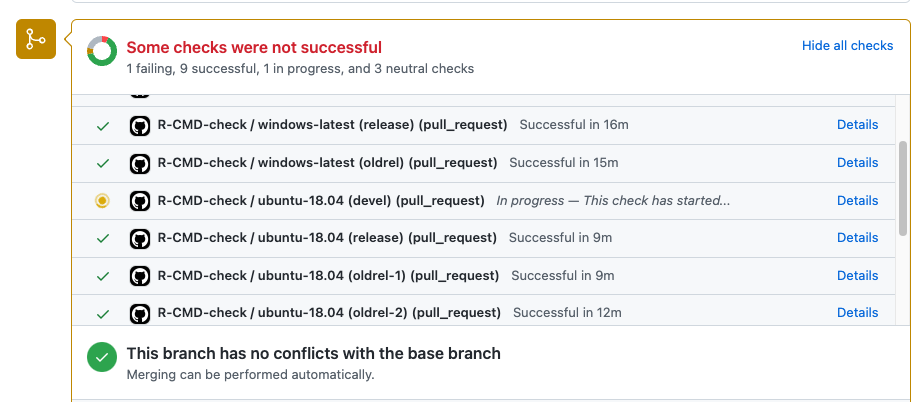Reflections one year into working as a research software engineer
Nicholas Tierney
Telethon Kids Institute, Perth, Australia
UseR! 23rd June 2022
njt-user-2022.netlify.app
nj_tierney
How/where do I work?
- I am a Research Software Engineer (RSE)
- Working at Telethon Kids Institute
- With the Malaria Atlas Project
- Primarily with Nick Golding
- Maintaining
gretasoftware - Embedded within a team
- Not consulted out to teams (usually)
- Develop software to help teams + for specific research problems
- Mixture of remote and at workplace
What sorts of things does an RSE do?
- Create software to solve research problems
- Develop tools that abstract the right components to facilitate research
- Help researchers to find and learn good tools
- Support researchers with (computational) reproducibility
(adapted from Heidi Seibold's UseR2021 Keynote talk)
The past year
- Understanding, improving, maintaining
greta - Develop new interfaces for statistical methods
- COVID modelling for Australian Government
why 'greta' ?
Grete Hermann (1901 - 1984)
wrote the first algorithms for computer algebra
... without a computer
(To avoid people saying 'greet', the package is spelled greta instead)

What greta looks like
α∼Normal(0,5)
β∼Normal(0,3)
σ∼logNormal(0,5) μ=α+βX
Y∼Normal(μ,σ)
x <- penguins$bill_length_mmy <- penguins$flipper_length_mmalpha <- normal(0,5)beta <- normal(0,3)sd <- lognormal(0,3)mu <- alpha + coef * xdistribution(y) <- normal(mu, sd)m <- model(mu, beta, sd)draws <- mcmc(m)Designing new interfaces
Malaria modelling
yahtsee (Yet Another Hierarchical Time Series Extension + Expansion)
cleaned_data <- data %>% as_tibble() %>% group_by(who_region) %>% transmute(.who_region_id = cur_group_id()) %>% ungroup(who_region) %>% select(-who_region) %>% group_by(country) %>% transmute(.country_id = cur_group_id()) %>% ungroup(country) %>% select(-country)Malaria modelling
model <- inlabru::bru(formula = pr ~ avg_lower_age + Intercept + who_region(month_num, model = "ar1", group = .who_region_id, constr = FALSE) + country(month_num, model = "ar1", group = .country_id, constr = FALSE), family = "gaussian", data = malaria_africa_ts, options = list(control.compute = list(config = TRUE), control.predictor = list(compute = TRUE, link = 1)) )Malaria modelling
yahtsee (Yet Another Hierarchical Time Series Extension + Expansion)
m <- fit_hts( formula = pr ~ avg_lower_age + hts(who_region, country), .data = malaria_africa_ts, family = "gaussian")Reflections; Advice
greta is complex: Where do you start
- 11,177 lines of code
- 1,535 tests
- ~705 functions
Getting to grips with a new code base
- Keep a notebook
- Get familiar with the code - use it!
- Go through the vignettes
- Read the helpfiles
- Use the code (again)
- Read the vignettes (again)
- Keep notes: questions, unexpected behaviour
- Talk to the maintainer often, clarifying questions
Getting to grips with a new code base?

Getting to grips with a new code base?


- Sort alphabetically, read through every line of code (really)
- Keep a document of things I note that could be improved
- ...16 pages of notes later, rearrange and organise into tasks/groups
You can smell without doing the cooking
You can smell without doing the cooking
Code Smells (I first heard through Jenny Bryan's UseR 2018 keynote):
is an evocative term for that vague feeling of unease we get when reading certain bits of code. It's not necessarily wrong, but neither is it obviously correct
You can smell without doing the cooking
Code Smells (I first heard through Jenny Bryan's UseR 2018 keynote):
is an evocative term for that vague feeling of unease we get when reading certain bits of code. It's not necessarily wrong, but neither is it obviously correct
- You can identify code patterns and smells even without deeply understanding the code
You can smell without doing the cooking
- Identifying repeated error messages
- Re-wording error messages
param_lengths <- vapply( params, function(x) length(x), FUN.VALUE = 1L )param_lengths <- lengths(params)Use snapshot tests
You want to test messages or output, e.g., that your code looks like this:
> greta array (data) [,1] [,2] [,3][1,] 1 4 7[2,] 2 5 8[3,] 3 6 9Use snapshot tests: before
# data arrays# print methodga_data <- as_data(matrix(1:9, nrow = 3))expected_output <- paste0( "greta array (data)\n\n [,1] [,2] [,3]\n[1,]", " 1 4 7\n[2,] 2 5 8\n[3,] 3", " 6 9")result <- evaluate_promise(ga_data, print = TRUE)expect_identical(result$output, expected_output)Snapshot tests: after
# data arrays# print methodga_data <- as_data(matrix(1:9, nrow = 3))expect_snapshot( ga_data)Snapshot test
# print and summary work Code ga_data Output greta array (data) [,1] [,2] [,3] [1,] 1 4 7 [2,] 2 5 8 [3,] 3 6 9Snapshot tests: error message testing before
# wrong class of objectexpect_error( as_data(NULL), "objects of class NULL cannot be coerced to greta arrays" )expect_error( as_data(list()), "objects of class list cannot be coerced to greta arrays" )expect_error( as_data(environment()), "objects of class environment cannot be coerced to greta arrays" )Snapshot tests: error message testing after
# wrong class of objectexpect_snapshot_error( as_data(NULL))expect_snapshot_error( as_data(list()))expect_snapshot_error( as_data(environment()))Snapshot tests: error messages output
# as_data errors informatively Object cannot be coerced to <greta_array> Objects of class <NULL> cannot be coerced to a <greta_array>--- Object cannot be coerced to <greta_array> Objects of class <list> cannot be coerced to a <greta_array>--- Object cannot be coerced to <greta_array> Objects of class <environment> cannot be coerced to a <greta_array>---- Also provides a useful way to review all error messages - you can read over error/warning/messages in bulk
- E.g., change from:
- "Error: Wrong dimensions for X" to
- "Error: Dimensions for X must be Z, but we see X has dimensions Y"
Use Version Control
- Git/mercurial/SVN/whatever
Use Version Control
Git/mercurial/SVN/whatever
github/bitbucket/gitlab/whatever
Use Version Control
Git/mercurial/SVN/whatever
github/bitbucket/gitlab/whatever
If you develop a new changes, make a new branch.
- The minor convenience is worth the relief.
- The relief of making changes to the code, making a bunch of mistakes, realising it would break a lot of things downstream and that you can safely leave it be and it will not ruin your code. It is very satisfying.
Write useful commit messages
Do:
- Finish the sentence: "This commit will..."*
- "This commit will use message instead of stop"
Don't
- "No hyphen, ugh"
- "uhhhh, try putting dev mockery back?"
* heard from Adam Gruer
Save time with pr_fetch() and pr_finish()
These are amazing functions that help save me a bit of time every day
pr_fetch(101): Grabs Pull Request 101 from github into your local sessionpr_finish(101): After you've merged your PR on github, deletes the branch locally and remotely, makes sure you are back on main branch- There are more (which I should probably learn) see the usethis docs
Continuous integration: it will save you time
- Run your code on someone else's (GitHub's) machine
- Run your tests - check things work
Continuous integration: it will save you time...eventually

....Eventually
- Sometimes it feels like you'll be doing a lot of waiting
....Eventually
Sometimes it feels like you'll be doing a lot of waiting
Push...wait 23 minutes for it to finish building on Windows
....Eventually
Sometimes it feels like you'll be doing a lot of waiting
Push...wait 23 minutes for it to finish building on Windows
Push...google some obscure error message
....Eventually
Sometimes it feels like you'll be doing a lot of waiting
Push...wait 23 minutes for it to finish building on Windows
Push...google some obscure error message
Realise you have specified
shell: RScript {0}instead ofshell: Rscript {0}(there is an upper caseSin the first one. Thank you Jim Hester for finding this)
....Eventually
Sometimes it feels like you'll be doing a lot of waiting
Push...wait 23 minutes for it to finish building on Windows
Push...google some obscure error message
Realise you have specified
shell: RScript {0}instead ofshell: Rscript {0}(there is an upper caseSin the first one. Thank you Jim Hester for finding this)Realise you have spent several days debugging some issue with GH actions that was actually just some missing
{
....Eventually
- I feel like I spent 90% of last year trying to get GH actions passing
....Eventually
I feel like I spent 90% of last year trying to get GH actions passing
I really wish I had learnt a bit about it before blindly pushing changes - e.g., that you can run actions locally
....Eventually
I feel like I spent 90% of last year trying to get GH actions passing
I really wish I had learnt a bit about it before blindly pushing changes - e.g., that you can run actions locally
Some sample commit messages:
"Try windows old-rel instead of 3.6"
- "No hyphen, ugh"
- "use oldrel-1 and oldrel-2 instead of oldrel and R 3.5"
- "ugh, mockery was there twice. Try removing the dev versions again?"
- "uhhhh, try putting dev mockery back?"
- "what happens on CI if we don't use mockery dev?"
... Eventually - the "always failing" paradox
- If your tests fail, does your software actually work?
... Eventually - the "always failing" paradox
If your tests fail, does your software actually work?
A single test failure doesn't mean it is broken!
... Eventually - the "always failing" paradox
If your tests fail, does your software actually work?
A single test failure doesn't mean it is broken!
gretastay in a place of "it isn't any more broken than before..."
... Eventually - the "always failing" paradox
If your tests fail, does your software actually work?
A single test failure doesn't mean it is broken!
gretastay in a place of "it isn't any more broken than before..."Slightly brain melting: trying to diff error messages and mentally regression test them. Not what it is designed for.
... Eventually - the "always failing" paradox
If your tests fail, does your software actually work?
A single test failure doesn't mean it is broken!
gretastay in a place of "it isn't any more broken than before..."Slightly brain melting: trying to diff error messages and mentally regression test them. Not what it is designed for.
Waiting 1-24 minutes for a build to finish can be a massive time suck.
Use reproducible examples
- Wrap up small problems into small examples with
reprex - The act of reprexing has solved many problems for me!
- It helps others solve your problem as well
- A "video reprex" can also be useful/better. (e.g., demo spooky browser behaviour)
Prefer glue over paste/sprintf
dist_type <- "normal"n_dim <- 6paste0("Following a ", dist_type, " distribution with ", n_dim, " dimensions")## [1] "Following a normal distribution with 6 dimensions"Prefer glue over paste/sprintf
dist_type <- "normal"n_dim <- 6paste0("Following a ", dist_type, " distribution with ", n_dim, " dimensions")## [1] "Following a normal distribution with 6 dimensions"glue("Following a {dist_type} distribution with {n_dim} dimensions")## Following a normal distribution with 6 dimensionsSee my blog post, "glue magic Part 1"
Use cli to construct messages: good
print_file_msg_paste <- function(n_file){ msg <- ifelse(test = n_file == 1, yes = paste0("Found ", n_file, " file"), no = paste0("Found ", n_file, " files")) cat(msg)}Use cli to construct messages: good
print_file_msg_paste(0)## Found 0 filesprint_file_msg_paste(1)## Found 1 fileprint_file_msg_paste(2)## Found 2 filesUse cli to construct messages: better
print_file_msg_cli <- function(n_file){ cat(format_message("Found {n_file} file{?s}"))}Use cli to construct messages: better
print_file_msg_cli(1)## Found 1 fileprint_file_msg_cli(2)## Found 2 filesprint_file_msg_cli(3)## Found 3 filesR Packages aren't always the answer
- Not everything needs to be an R package
- Sometimes analysis code isn't always appropriate to change to package code. See Miles McBain's blog post "Project as an R package: An okay idea" on this.
The Future
RSEs and software are starting to get more credit
In the past 12 months:
- Nature article: Why science needs more research software engineers, by Chris Woolston
- Monash University Business School now recognises software as first class academic output
- Statistical Society of Australia (SSA) hosted a panel session on RSEs
- ACEMs podcast: acknowledging research software
- I delievered seminar: "Acknowledging research software in academia" at UNSW
- SSA has developed two awards for statistical software:
- Di Cook Award ($1000): Student prize for Victoria and Tasmania
- Venables Award ($5000): National statistical software prize
Thanks
- Nick Golding
- Miles McBain
- Heidi Seibold
- Heather Turner
- Dianne Cook
- Rob Hyndman
- Maëlle Salmon
- Karthik Ram
Resources
Colophon
- Slides made using xaringan
- Extended with xaringanthemer
- Colours taken + modified from lorikeet theme from ochRe
- Header font is Josefin Sans
- Body text font is Montserrat
- Code font is Fira Mono
- template available: njtierney/njt-talks
Learning more
End.